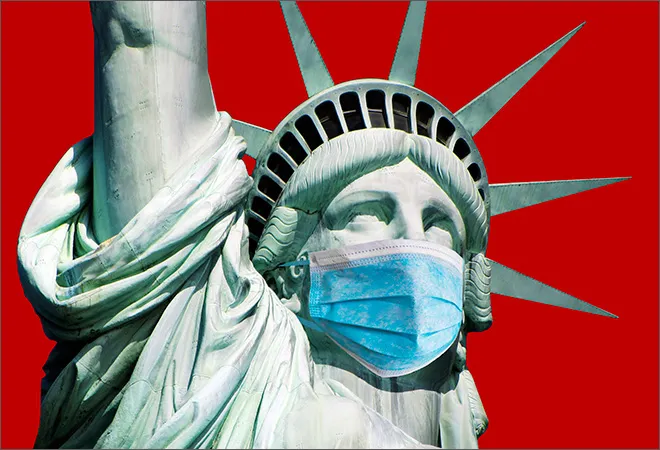
Among the more memorable lines from Albert Camus’ haunting novel,
The Plague, possibly the most read and quoted book in the Year of the Pandemic, is a starkly stated fact: “Stupidity has a knack of getting its way.”
If “You are on mute” was the most common interjection during COVID-19-enforced digital conversations in the conference circuit, a close second would be the assertion, “We have to work with a rising China to make it a responsible actor.” You could voice this assertion, or a similar variant, at a think-tank discussion or official consultation in Western Europe or America and be appreciated for possessing a wise and rational mind. If you were to say it many times over with panache and flair, you could bag a serious policy job in that part of the world. Money talks; the profundity of banal wordsmiths runs marathons.
The Old World cannot ‘make’ China act in any way it tells it to.
For there are two fatal flaws in this line of thought. The first flaw has to do with “the rise of China.” This is the last decade’s conversation; outdated and irrelevant. China has already risen, and it is everything many did not wish it to be, even as they were investing in its emergence. Deal with it now by accepting this reality. The second flaw pertains to the rather misplaced assessment of Western power embedded in these seemingly highfalutin but inane assertions. The Old World cannot ‘make’ China act in any way it tells it to. In fact, the West does not even know what it wants from China besides trade and investment. A popular refrain of yesteryears was that while all countries have an army, in Pakistan, the army has a country. Today’s refrain is reflected in what someone recently said, without exaggerating: In Germany the auto industry has its own union, the European Union.
2020 was a crucial year for China. Its claim to global leadership was severely tested by its role in, and early mismanagement of, the COVID-19 pandemic. It faced pushback, including from unexpected quarters, on its deluge of misinformation and its subversion of international institutions to divert attention from its malfeasance. The pandemic was to be the moment of reckoning, when the old and new powers would come together and hold Beijing to account. Predictions that the pandemic would prove to be China’s ‘Chernobyl moment,’ however, have turned out to be hollow. China was among the few countries that weathered the public health crisis with a modicum of control. A year later, it is leveraging trade, technology and international development to capitalise on this and further consolidate its influence and power. As a new American President prepares to assume office, China has sent him a greeting card with three messages conveying the terms of Beijing’s engagement with Washington and other world capitals.
What else could explain why the EU enthusiastically rushed to conclude the EU-China Comprehensive Agreement on Investment?
The first message is that China is too big to be ignored and too wealthy to displease. This is the obvious
subtext of the EU-China Comprehensive Agreement on Investment (CAI). What else could explain why the EU enthusiastically rushed to conclude this agreement? Brussels ignored the Biden transition team’s pleas to delay the agreement. It ignored China’s rogue behaviour in 2020 — a massive human rights crackdown in Hong Kong and Xinjiang, a destabilising escalation of tensions in the Himalayas, its aggressive ‘wolf warrior’ diplomacy, and the economic coercion of Australia, among others. The EU even ignored its own evolving assessments of China, with expressions like “European values,” “systematic rival,” and “strategic autonomy” proving to be meaningless phrases that are no more than an anodyne dressing for a toxic salad. The EU has not only handed Beijing a victory ahead of the transition in Washington, but it has also bolstered China’s belief that its centrality to global value chains provides it with clout beyond its own imagination.
 Among the more memorable lines from Albert Camus’ haunting novel, The Plague, possibly the most read and quoted book in the Year of the Pandemic, is a starkly stated fact: “Stupidity has a knack of getting its way.” Photo illustration: Anton Petrus — Getty
Among the more memorable lines from Albert Camus’ haunting novel, The Plague, possibly the most read and quoted book in the Year of the Pandemic, is a starkly stated fact: “Stupidity has a knack of getting its way.” Photo illustration: Anton Petrus — Getty
The second message is that China is too big to punish. Under President Donald Trump, the US attempted to systematically choke China’s access to global technology supply chains through sanctions, export controls, and coercive diplomacy. While those efforts have had some success, China has doubled down on its efforts to indigenise the development of breakthrough technologies — an effort that has seen remarkable success during the past two decades. Now it plans to return the favour. In early January, China’s Ministry of Commerce published
rules encouraging firms incorporated in China to defy sanctions and export controls, and threatened to punish those that do not. When, and not if, these rules are implemented, technology and financial firms in particular will find themselves caught between a rock and a hard place. These rules are a clear warning to the Biden Administration and to its supporters and funders from Wall Street and Silicon Valley. The Chinese Communist Party (CCP) is betting that America Inc. will prefer to devote resources to lobby Washington for a rapprochement with Beijing rather than contend with fragmentation and the attendant loss of profits.
The pandemic has accorded China the chance to offer developing nations not just infrastructure finance, but a multifaceted development opportunity — one that further entrenches China’s norms, standards and preferences.
The final message is that China is simply too big to fail. Media pundits are
reading a slowdown in Belt and Road (BRI) investments as a sign that China is reconsidering the project’s utility. This is way off the mark. The institutions and mechanisms of the BRI are rapidly turning into conduits for China to deliver global public goods and will remain so even as project-funding is rationalised. State Councillor Wang Yi made three priorities explicit for 2021 in his
speech at December’s Belt and Road Forum: The Heath Silk Route, the Digital Silk Route and the Green Silk Route. Each plays to China’s strengths and are crucial components of its 2021
white paper on international development cooperation. The pandemic has accorded China the chance to offer developing nations not just infrastructure finance, but a multifaceted development opportunity — one that further entrenches China’s norms, standards and preferences.
These messages should not come as a surprise to those who track Beijing. As we argued in our book
Pax Sinica, these recent developments represent China’s continuing efforts to recast globalisation and international governance in its own image. The year 2021 is an important milestone for the CCP and for Chairman Xi Jinping. It marks the 100
th anniversary of the founding of the CCP, the first of two centenaries central to the realisation of the ‘China Dream.’ Leading up to this point, ‘Core Leader’ Xi has consolidated his hold over the CCP, and the party has, in turn, consolidated its control over society, industry, military and every aspect of policy. Xi has already
acknowledged that the path towards global leadership by 2049 — the centenary of the founding of the People’s Republic of China — will be defined by “turbulent change.” While he did not explicitly say so, external risk fuelled by geopolitical rivalry with the US and a more wary international community were likely on his mind.
China’s messages should not be interpreted as a prophetic prediction of its continued and unchallenged rise or that it is immune from political strains and irrationality.
These three messages to the world in early-2021 indicate how China is anticipating and responding to emerging realities. Yet, China’s messages should not be interpreted as a prophetic prediction of its continued and unchallenged rise or that it is immune from political strains and irrationality.
The pandemic has bookended an international order living out its last days, much like King Lear. Contrary to popular expectation, a Biden White House will not — or, cannot, if you prefer — reverse this trend. The world will still be driven by populism and fragmentation. Communities across geographies are anxious about change. Information disorder, technological and industrial developments, and ecological crises are demanding new ideas and leadership. China is the first power to have a dark but coherent proposition — one defined by techno-authoritarianism and state control.
Is there any other alternative on the table? Or will the decline of the incumbents be scripted by Beijing and its growing global constituency of cheerleaders?
The views expressed above belong to the author(s). ORF research and analyses now available on Telegram! Click here to access our curated content — blogs, longforms and interviews.



 Among the more memorable lines from Albert Camus’ haunting novel, The Plague, possibly the most read and quoted book in the Year of the Pandemic, is a starkly stated fact: “Stupidity has a knack of getting its way.”
If “You are on mute” was the most common interjection during COVID-19-enforced digital conversations in the conference circuit, a close second would be the assertion, “We have to work with a rising China to make it a responsible actor.” You could voice this assertion, or a similar variant, at a think-tank discussion or official consultation in Western Europe or America and be appreciated for possessing a wise and rational mind. If you were to say it many times over with panache and flair, you could bag a serious policy job in that part of the world. Money talks; the profundity of banal wordsmiths runs marathons.
Among the more memorable lines from Albert Camus’ haunting novel, The Plague, possibly the most read and quoted book in the Year of the Pandemic, is a starkly stated fact: “Stupidity has a knack of getting its way.”
If “You are on mute” was the most common interjection during COVID-19-enforced digital conversations in the conference circuit, a close second would be the assertion, “We have to work with a rising China to make it a responsible actor.” You could voice this assertion, or a similar variant, at a think-tank discussion or official consultation in Western Europe or America and be appreciated for possessing a wise and rational mind. If you were to say it many times over with panache and flair, you could bag a serious policy job in that part of the world. Money talks; the profundity of banal wordsmiths runs marathons.
 Among the more memorable lines from Albert Camus’ haunting novel, The Plague, possibly the most read and quoted book in the Year of the Pandemic, is a starkly stated fact: “Stupidity has a knack of getting its way.” Photo illustration: Anton Petrus — Getty
Among the more memorable lines from Albert Camus’ haunting novel, The Plague, possibly the most read and quoted book in the Year of the Pandemic, is a starkly stated fact: “Stupidity has a knack of getting its way.” Photo illustration: Anton Petrus — Getty PREV
PREV


